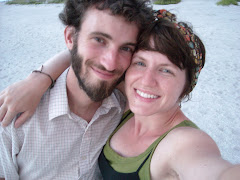Yesterday we finally managed to download and listen to This American Life's episode on Haiti, "Island Time." Run, do not walk, your browser to this page, because you do not want to miss this. It points out the incredible complexities of life in Haiti, from the challenges of capacity-building to the difficulties inherent in small business development. This episode is such an interesting, accurate peek at this little country, although it also made me nearly unbearably sad. The longer we're here the steeper the road ahead seems to get.
[Six Degrees side note: the Gary mentioned at the beginning of Act Three is the Depps' sixty-something neighbor, a self-proclaimed curmudgeon who came to Haiti twenty years ago as a Peace Corps volunteer, married a Haitian woman, and stayed. Before his two kids went to the States, they would sometimes come through the broken wall between the yards to use the internet.]
Yesterday Alexis and I also interviewed a group of folks who lost their homes in the earthquake. MCC had been distributing food to the approximately forty families who have set up camp in an open space in their hillside neighborhood, but because MCC ended that phase of the disaster response on April 30, we wanted to see how that change has had an impact on people.
I was trepidatious about having these conversations because saying, "hey, we stopped giving you food and we're not here to give you anything else - does that work for you?" seemed so awkward. However, I was pleasantly surprised. They were not that upset about the end of food aid, since most of them can now afford to buy food nearly every day. They pointed out that free stuff is always nice, but if they had their druthers they'd like to choose their own things.
And how would they like to do this? They'd like jobs. Working for money, not food.
A job is actually the number-one thing the average Haitian wanted before the earthquake. Jobs mean salaries and security. Jobs mean being able to support a family.
It's a perfectly reasonably, perfectly dignified thing to want, but I've always been struck by the fact that even Haitians who run their own small businesses still want jobs. Many people don't seem to think of these enterprises as jobs - or perhaps they want other benefits that come along with being an employee at someone else's business?
Speaking unscientifically, I think there are more entrepreneurs per capita in Haiti than in the U.S. Most of that 70% counted as "unemployed" in Haiti actually work: they are street vendors, or operate one-pot tent restaurants, or build houses as day laborers.
So what is stopping these folks from a.) thinking of themselves as entrepreneurs/ small business owners, or b.) growing their businesses to the point at which they can hire others?* Why would so many prefer to work for an international company/NGO?
* Some are, some do. For example, we talked to 9 artisans in Jacmel a few weeks ago, and nearly all of them run workshops employing 5-15 others.
This situation is a mystery to me (okay, partially due to my ongoing incomprehension of economics and how you "build" an economy). Is there a tax structure that should be changed to make it easier for people to officially start new businesses? Should classes in management and accounting be made more available?
One of my dreams for Haiti is to see thousands of middle managers roaming the streets of every city and small town in the country. Having middle managers means having larger business owners and having workers to oversee. It means people with enough money to pay for things like a casual meal out with their families. It means service industries. It means a wide range of jobs, at all levels of income.
Oh, if it were only as easy as handing out briefcases...
Wednesday, May 26, 2010
Subscribe to:
Post Comments (Atom)


No comments:
Post a Comment